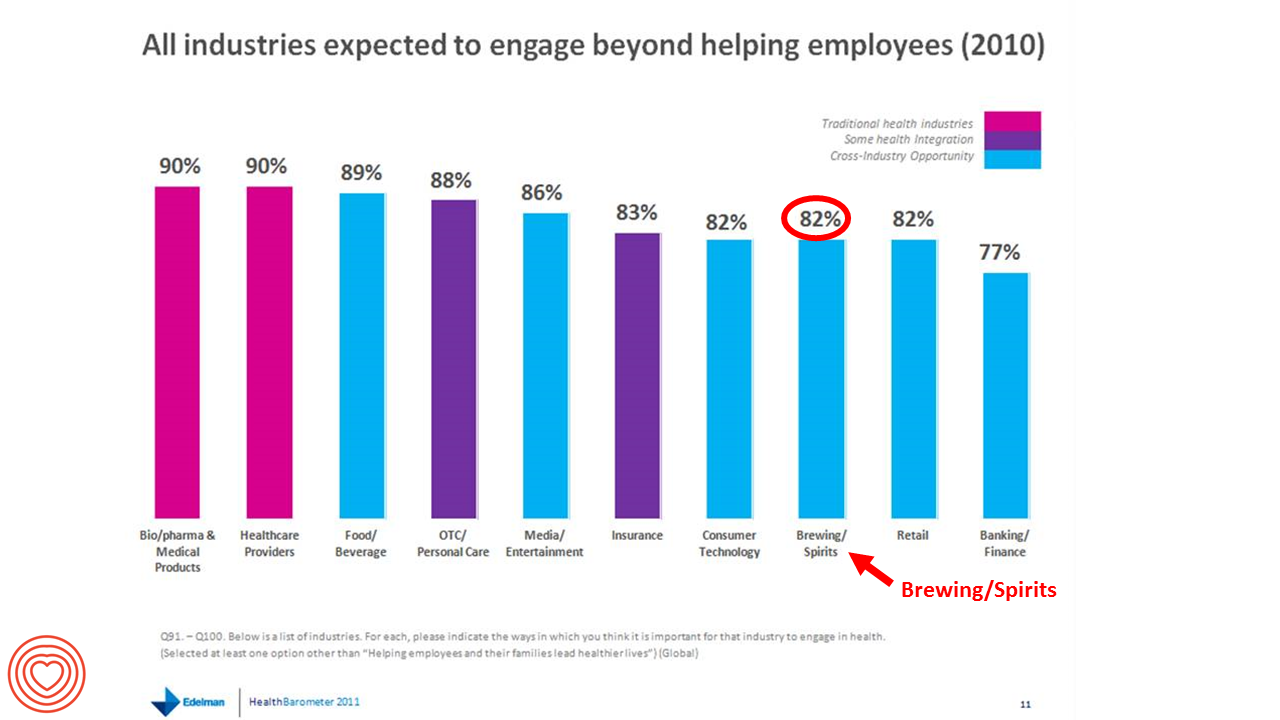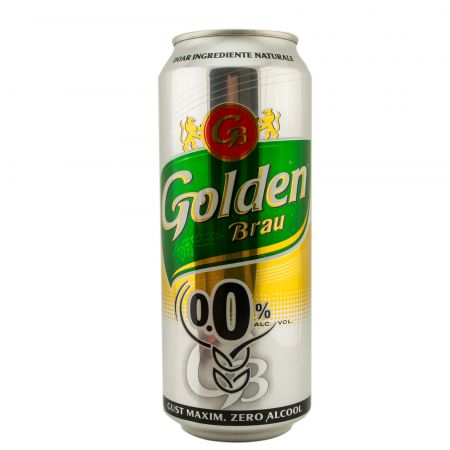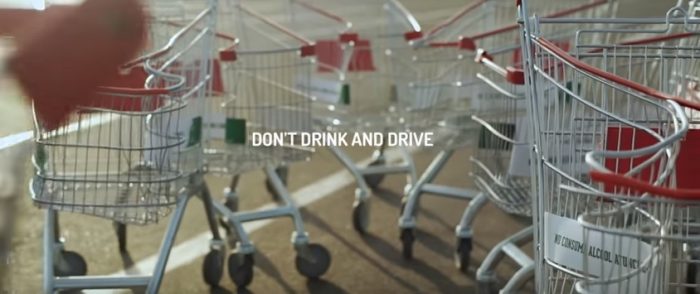
More consumers are seeking health-making opportunities everywhere, both within and outside of traditional healthcare touch-points. That includes peoples’ consumption of beer.
We learned from the Edelman Health Engagement Barometer that consumers seek to engage for health beyond healthcare organizations – namely, hospitals, providers, over-the-counter medicines, pharma and insurance.
What was perhaps the most surprising industry segment consumers called on for personal health engagement was brewing and alcohol.
Fully 8 in 10 consumers expect brewing and spirits companies to engage in health. The bar chart shows this finding, arraying beer and liquor producers on par with retail and consumer technology, along with insurance.
Since these survey results were published in 2010, I’ve used this chart in meeting and brainstorming with both traditional healthcare industry stakeholders along with new entrants seeking to address consumers’ interests in self-care and making health for themselves and with their families and communities.
As patients are growing into healthcare consumers with the adoption of high-deductible health insurance plans and more DIY-demands for self-care and choice, the supply-side landscape is expanding for these individual industries along with collaborative opportunities to both develop products and services and educate people for self-health.
 Here’s a great video example, called “The Cart Crash,” which is an ad for Golden Brau 0.0% alcohol launched in Romania speaking to drunk driving and the role of non-alcoholic beer for people who want to drink and drive this holiday season. The ad developer explained the background for this campaign: “Beer is very popular in Romania. We like to drink beer when going out, at home, pretty much on every occasion. And this is good for Golden Brau, since it is a well-established brand. But this can easily backfire in a country with lots of car accidents caused by drinking and driving – and here comes the ‘extension’ of the brand, Golden Brau 0.0% Alcohol. Its main mission is to educate and increase responsibility by ‘activating’ its consumers in a very sharp way, close to their drinking occasions, in what we call ‘The Pivotal Moment’.
Here’s a great video example, called “The Cart Crash,” which is an ad for Golden Brau 0.0% alcohol launched in Romania speaking to drunk driving and the role of non-alcoholic beer for people who want to drink and drive this holiday season. The ad developer explained the background for this campaign: “Beer is very popular in Romania. We like to drink beer when going out, at home, pretty much on every occasion. And this is good for Golden Brau, since it is a well-established brand. But this can easily backfire in a country with lots of car accidents caused by drinking and driving – and here comes the ‘extension’ of the brand, Golden Brau 0.0% Alcohol. Its main mission is to educate and increase responsibility by ‘activating’ its consumers in a very sharp way, close to their drinking occasions, in what we call ‘The Pivotal Moment’.
Remember: safe driving and roads, and moderate alcohol consumption, are social determinants of health.
Health Populi’s Hot Points: Earlier this year, Heineken, the brewer of Golden Brau 0.0%, launched a non-alcoholic beer in its own name which has one-half the calories of a classic Heineken or single service of Coca-Cola. Consumers’ search for healthier lifestyles, wellness, and chronic care self-management offer consumer goods, food, technology, retail and financial services companies to meet-up and engage with people to support their personal health-making objectives. The Edelman Health Barometer bar chart bolsters the evidence on that demand side.
The opportunities to collaborate are many, and should motivate healthcare industry stakeholders to forge new, creative relationships that meet their patients where people want to make health – at home, school, on-the-go in a smart(er) car, at the bank, at work, at the gym or grocery store.
Food is a low-hanging fruit opportunity for healthcare and industry partnerships. Evidence published in JAMA Internal Medicine that SNAP benefit participation can reduce health care costs for people with lower incomes is but one scenario that should spur partnerships between healthcare providers, pharma, and food industry players. Another example is Geisinger Health System’s Fresh Food Farmacy, providing food to patients managing Type 2 Diabetes; Geisinger is partnering with The Central Pennsylvania Food Bank, the Degenstein Foundation, The Luzerne Foundation Logos Fund, and Weis Markets, a grocery chain.
Such partnerships can help realize that elusive, noble Triple Aim: reduce per capita health care costs, drive better health outcomes, and improve (even delight) the healthcare experience for people.





 Interviewed live on BNN Bloomberg (Canada) on the market for GLP-1 drugs for weight loss and their impact on both the health care system and consumer goods and services -- notably, food, nutrition, retail health, gyms, and other sectors.
Interviewed live on BNN Bloomberg (Canada) on the market for GLP-1 drugs for weight loss and their impact on both the health care system and consumer goods and services -- notably, food, nutrition, retail health, gyms, and other sectors. Thank you, Feedspot, for
Thank you, Feedspot, for  As you may know, I have been splitting work- and living-time between the U.S. and the E.U., most recently living in and working from Brussels. In the month of September 2024, I'll be splitting time between London and other parts of the U.K., and Italy where I'll be working with clients on consumer health, self-care and home care focused on food-as-medicine, digital health, business and scenario planning for the future...
As you may know, I have been splitting work- and living-time between the U.S. and the E.U., most recently living in and working from Brussels. In the month of September 2024, I'll be splitting time between London and other parts of the U.K., and Italy where I'll be working with clients on consumer health, self-care and home care focused on food-as-medicine, digital health, business and scenario planning for the future...